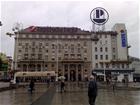A Year Before Croatia's Accession to the EU
Adelina Marini, May 15, 2012
 The current crisis in the EU or should I say the current crises, because they are not one or two, is due mainly to the motivation which drove the Union toward further enlargement through the years. We are already in the phase where finger-pointing is useless and where the wounds are so deep that prevent us to soberly assess who is to blame and why. But it is clear that the main reason for the current unstable situation of a unique project is rooted in the various levels of development of its components. This is why, from now on, the criteria for accession to the Union itself, as well as to its various more integrated community circles (the euro area, Schengen and since recently the fiscal compact) must be further specified and made more precise.
The current crisis in the EU or should I say the current crises, because they are not one or two, is due mainly to the motivation which drove the Union toward further enlargement through the years. We are already in the phase where finger-pointing is useless and where the wounds are so deep that prevent us to soberly assess who is to blame and why. But it is clear that the main reason for the current unstable situation of a unique project is rooted in the various levels of development of its components. This is why, from now on, the criteria for accession to the Union itself, as well as to its various more integrated community circles (the euro area, Schengen and since recently the fiscal compact) must be further specified and made more precise.
One report - many interpretations
In the end of April the European Commission presented its regular monitoring report about Croatia, the purpose of which is to follow closely whether the country is sticking to its commitments, on the basis of which was taken the decision the country to join the EU as of 1st of July 2013, as well as to assess progress on the few remaining tasks. My experience so far makes me read such documents very carefully and to search between the lines. On the one hand the report, because of all the above mentioned reasons, must be as unbiased and precise as possible, because, although Croatia is small and easy to swallow, Greece is also not very large, compared to the rest of its partners, but put into question the very existence of the eurozone and therefore of the entire EU. This report, as well as the remaining (the Commission will come up with reports every 6 months until accession) has to be honest to the other member states and their citizens.
But on the other hand, again because of the current situation, the EU would hardly swallow bad news from Zagreb. At this stage, in the 12-page document there are no bad news, on the contrary, but it always depends on who is reading. Because of the second reason (that the EU would find it difficult to accept bad news), I decided to make a rough comparison between this report and the document the Commission published in 2006 regarding Bulgaria's preparedness to become a member. The situation is very similar - a year before accession, with a signed treaty and champagne drank out. The differences are astonishing, which can only make one happy because, if nothing else, Bulgaria's and Romania's failure to complete key reforms five years after accession, has proved a better motivation this to be avoided with Croatia.
reason (that the EU would find it difficult to accept bad news), I decided to make a rough comparison between this report and the document the Commission published in 2006 regarding Bulgaria's preparedness to become a member. The situation is very similar - a year before accession, with a signed treaty and champagne drank out. The differences are astonishing, which can only make one happy because, if nothing else, Bulgaria's and Romania's failure to complete key reforms five years after accession, has proved a better motivation this to be avoided with Croatia.
There were no abrupt changes with Croatia in the methodology of negotiations, but there certainly were more efforts in the most painful areas - painful for the entire region of the Balkans by the way. However, there are very serious changes for all the countries that will follow. For example, Montenegro will start negotiations not from Chapter 1 but from Chapters 23 and 24 ("Judiciary and Fundamental Rights" and "Justice, Freedom and Security"). This will be valid for all the rest, queueing up for European membership - Macedonia, Serbia, Albania, etc.
Croatia's report of April 24 consists of 4 points, on which there is still work to be done: competition policy; judiciary and fundamental rights; justice, freedom and security; a general review of all the other areas, where the general situation is just marked on already agreed and complete things.
Regarding competition policy, what Zagreb still needs to do is to complete the privatisation of the only remaining relatively vital shipbuilding company Brodosplit, as well as to find solution to the other two - 3 May and Brodotrogir. The restructuring of the shipbuilding sector was one of the most difficult issues in the entire negotiating process of Croatia on her path to membership, which started in 2005 together with Turkey.
Judiciary and fundamental rights
 As a whole, the measures undertaken in 2010 and 2011 to strengthen the independence, accountability, impartiality and professionalism in the judiciary have continued. This is a very important conclusion from a Bulgarian perspective because, if one follows the Bulgarian experience and all the reports so far, will see that many of the measures undertaken by governments in a row were aimed at ensuring a "positive" report and then immediately started a process of amendments and adjustments, so that the status quo could be kept. Obviously this was avoided with the Croatians. Please pay attention to the measures in question, because they are very similar to the Bulgarian ones.
As a whole, the measures undertaken in 2010 and 2011 to strengthen the independence, accountability, impartiality and professionalism in the judiciary have continued. This is a very important conclusion from a Bulgarian perspective because, if one follows the Bulgarian experience and all the reports so far, will see that many of the measures undertaken by governments in a row were aimed at ensuring a "positive" report and then immediately started a process of amendments and adjustments, so that the status quo could be kept. Obviously this was avoided with the Croatians. Please pay attention to the measures in question, because they are very similar to the Bulgarian ones.
"The reformed State Judicial Council (SJC) and State Prosecutorial Council (SPC) have continued to function independently. Both bodies have continued to appoint judicial officials based on transparent, uniform and objective criteria". To compare, in Bulgaria the problem with the Supreme Judiciary Council and the appointment of its members is an object of the interim report of the Commission of 2012! What has to be done, however, is pointed out in the Croatians' report, is to improve the implementation of the transitional system of appointments of judges, including greater transparency of marking oral interviews, with attention paid to ensuring equal treatment of all candidates. It is also necessary to amend the secondary legislation with the aim to limit the immunity of judges. Besides, the SJC and the SPC need to be provided with further administrative resources to function more effectively.
It is especially noted that Croatia needs to improve human resources planning, including for the long-term needs of the judiciary. The entry into force of the new system  of public bailiffs is delayed. It is expected the system to become operational as of 1st of July 2012.
of public bailiffs is delayed. It is expected the system to become operational as of 1st of July 2012.
There are good news also with regard to improvement of the efficiency of the judiciary of the country. It is noted that the merger of courts as part of the court rationalisation process is continuing. The enforcement of court decisions has improved, especially through the work of the financial agency FINA. The Integrated Case Management System is operational in about 60% of courts. Between December 2010 and December 2011, the overall number of pending cases increased by 5.2%. There is a continuing reduction in the backlog of old criminal cases, falling by 12.3% in the year to December 2011. However, the number of old civil cases increased by 6.5% in the same period, while the number of old civil cases at first instance courts fell by 9.5%. The European Commission recommends Croatia to pay special attention to the higher courts, including the Supreme Court, ensuring that they are adequately equipped to handle the disproportionate increase as cases advance through the system.
It is called for vigilance also regarding corruption at local level and more specifically in terms of public procurement. It is necessary the implementation of the legal framework on the seizure and confiscation of assets to be reinforced across the board. The public procurement legislation (the need of new such was noted with a huge exclamation mark in the Commission report for Bulgaria in 2010) is aligned since January 2012 on the basis of government proposals as of 2011, providing for increased transparency, including publication of information on the actual execution of contracts. However, little information is made public so far. Instead, the legislation treating conflict of interests is improved, it is stricter and is enforced as of the beginning of 2011, although the members of the new Conflict of Interest Commission have still not been  appointed, which actually prevents the implementation of the legislation. It is expected the system of verification of assets declarations and unjustified wealth to be strengthened.
appointed, which actually prevents the implementation of the legislation. It is expected the system of verification of assets declarations and unjustified wealth to be strengthened.
Justice, freedom and security
This chapter treats a very painful for Bulgaria topic, which, however, the government in Sofia was quick to announce that it was no longer a priority - Schengen. Regarding external borders, the process of alignment with the Schengen acquis has continued by improving the system of integrated border management. Interagency cooperation, as well as coordination with the neighbouring countries and EU bodies in this field has advanced. Technically the country is also very well prepared, but still lacks a regulatory framework to cover SIRENE (which is part of the bureau for international police cooperation) and the national office of the Schengen Information System (SIS). What Croatia is expected to do more is to increase the level of confiscated assets, as well as to pay attention to the coordination of criminal and financial investigations and also to the implementation of the legal framework in the area of fight against human trafficking.
In general the speed with which Croatia works in its preparation for EU membership matches the expectations. A significant level of alignment is achieved with the European legislation and overall progress is scored. There is also progress on one of the very specific for Croatia (because of former Yugoslavia) topics - war crimes. Moreover, not only that the country has continued to process war crime cases but the new government has also established contacts with Serbia and Bosnia and Herzegovina. The big challenge for the country is tackling impunity. Measures are needed to facilitate the attendance of witnesses at trials.
In other words, a year before Croatia's accession the EU will not be forced to invent ways to cover a failure. Something, which is evident in the report for Bulgaria in 2006. "There remain serious concerns about the effectiveness of Bulgaria's fight against organised crime. While this has been a stated national priority there are still no tangible results in investigating and prosecuting organised crime networks, including the implementation of a multi-disciplinary strategy". The frequent contract killings are mentioned of people connected to organised crime, which seldom give rise to successful investigations and prosecutions.
"The National Service to Combat Organised Crime continues to suffer from a lack  of high quality staff and seems in general to have a reactive instead of a pro-active attitude", is another conclusion half a year before Bulgaria's joining the EU with a Control and Verification Mechanism in the area of the judiciary. A mechanism, the purpose of which was to help the country complete the started reforms within 3 years, but instead, five years later the Commission is expected to come up with a mega report, which to present guidelines how to be proceed further.
of high quality staff and seems in general to have a reactive instead of a pro-active attitude", is another conclusion half a year before Bulgaria's joining the EU with a Control and Verification Mechanism in the area of the judiciary. A mechanism, the purpose of which was to help the country complete the started reforms within 3 years, but instead, five years later the Commission is expected to come up with a mega report, which to present guidelines how to be proceed further.
Of course, we are yet to see what the Commission will write in its next report for Croatia in half a year, but it is sad when one reads the Croatian report because it is inevitable to make comparisons with the Bulgarian ones. Beyond sadness, though, it is very important how the EU will handle the preparation of its future members, drawing lessons from past mistakes, because here it is no longer about political, personal or national pride but about the very survival of the EU as a union of equal, democratic and economically stable nations, creating welfare for their citizens and succeeding in protecting them from external threats.
 Bakir Izetbegovic, Andrej Plenkovic | © Council of the EU
Bakir Izetbegovic, Andrej Plenkovic | © Council of the EU Aleksandar Vucic, Recep Tayyip Erdogan | © Serbian Presidency
Aleksandar Vucic, Recep Tayyip Erdogan | © Serbian Presidency Jean-Claude Juncker, Zoran Zaev | © European Commission
Jean-Claude Juncker, Zoran Zaev | © European Commission Kolinda Grabar-Kitarovic | © KGK
Kolinda Grabar-Kitarovic | © KGK Jozo Rados | © European Parliament
Jozo Rados | © European Parliament Aleksandar Vucic, Andrej Plenkovic | © Vlada RH
Aleksandar Vucic, Andrej Plenkovic | © Vlada RH